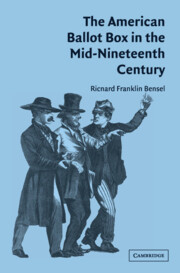Book contents
- Frontmatter
- Contents
- Preface
- Chapter 1 Introduction
- Chapter 2 Structure and Practice of Elections
- Chapter 3 Social Construction of Identity in Eastern Rural Communities
- Chapter 4 Ethno-Cultural Stereotypes and Voting in Large Cities
- Chapter 5 Frontier Democracy
- Chapter 6 Loyalty Oaths, Troops, and Elections during the Civil War
- Chapter 7 Conclusion
- Index
Chapter 6 - Loyalty Oaths, Troops, and Elections during the Civil War
Published online by Cambridge University Press: 10 November 2009
- Frontmatter
- Contents
- Preface
- Chapter 1 Introduction
- Chapter 2 Structure and Practice of Elections
- Chapter 3 Social Construction of Identity in Eastern Rural Communities
- Chapter 4 Ethno-Cultural Stereotypes and Voting in Large Cities
- Chapter 5 Frontier Democracy
- Chapter 6 Loyalty Oaths, Troops, and Elections during the Civil War
- Chapter 7 Conclusion
- Index
Summary
The American Civil War changed the way men voted. The most important change was the vast expansion of the role played by the federal government and its agents. This was the case everywhere except the eleven states of the Confederacy, which were, of course, out of the Union; although elections occurred in the South, there is very little information available on how they were conducted. In the North and in the border states, however, the Civil War imposed a new condition on voting: the legitimacy of an election now often depended on whether or not those loyal to the Union prevailed at the polls. This condition, in turn, justified the use of measures that had been almost unknown before the war. In the border states, for example, loyalty oaths were imposed as one of the requirements for determining voter eligibility. These oaths screened out those who had either actively supported the Confederate war effort or harbored southern sympathies without acting on them. In the border states and some northern states as well, Union troops and loyal state militia also appeared at the polls. Their presence was ostensibly intended to maintain order and protect the polls from Confederate guerrillas. In practice, however, their influence was more commonly felt through their own informal tests of voter loyalty; those merely suspected of hostility to the Republican party were often physically ejected from the polling place, whether or not they were willing to swear the required loyalty oath.
In many areas, opposition to the Republican party marked men as disloyal to the Union cause because the Republican party was always the most fervent and often the only organization supporting the northern war effort.
- Type
- Chapter
- Information
- The American Ballot Box in the Mid-Nineteenth Century , pp. 217 - 285Publisher: Cambridge University PressPrint publication year: 2004



